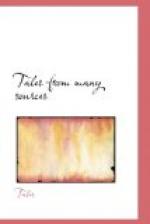As Betty was about to answer, she was arrested by the sound of singing outside, in a voice so wild, loud, and sweet, it seemed the very embodiment of the music of Nature.
“Who is singing like that?” asked Betty. “How beautiful! and how marvellously sad.”
“It is Nora Ray, only our Nora, dear heart. Her voice is sweet as the lark, and she sings old songs she gathers in the villages round.”
“Hush, hush, listen!” cried Betty, and she stood with upraised hand listening.
The air was in the minor key, the voice of the singer thrilled to the very nerves, every word came distinctly to their ears.
“Aye, Margaret loved the fair
gentleman,
Aye, well and
well-a-day,
And the winter clouds gather
wild and fast;
He loved, and
he galloped away.
Aye, call him! call him over
the lea,
Thou sad forsaken
lass,
Never more he’ll come
back to thee
Over the wild
green grass.
The swallows return from over
the sea,
Aye, well and
well-a-day;
But lover will never come
back to thee
Who loves and
gallops away.
Aye, call him! call him over
the sea,
The winter is
coming fast;
He waved his hat, he bowed
full low
And smiled as
he galloped past.
Aye, call him! call him over
the lea,
Aye, well and
well-a-day;
Lover will never come back
to thee
Who loves and
gallops away.”
A strange shiver came over Betty Ives, a thrill such as she had never experienced before. She glanced at Dame Rachel. The old woman was nervously fingering the cards, and muttering to herself. Then her frightened eyes turned to her lover; he read some appeal in them.
He held out his hand, and caught hers and pressed it for one short second to his lips.
The door burst open, and the girl who had been singing came in; her black hair was all blown back, the great black eyes staring out of the small dark face. She drew her scanty cloak round her and laughed a shrill laugh.
“Will you have your fortunes told, my good gentleman? my pretty lady?” she cried. “Cross little Nora’s palm with a silver sixpence then.”
“No, no, we have had enough of that. Come, dear madam, we must be going,” said Johnstone, and he conducted Betty to the place where Reuben, faithful to his trust, held the rein of her horse.
“Do not be so long without coming to see me again, dear heart,” cried Rachel Ray, standing outside her door.
“No, no, I will come soon,” answered Betty. Johnstone placed her in the saddle.
“A good gallop over the downs will bring back the colour to your cheek,” he said softly. “You are so white and cold.”
“There is something ill-omened in all here,” said Betty with a slight shiver.
“Here, Nora,” cried Johnstone, flinging her a piece of gold. “This is to make up for the loss of that silver sixpence.”




